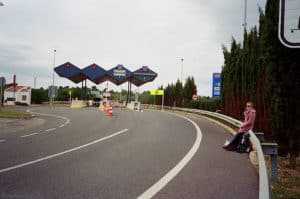By Scott Homan
Traveling abroad for roughly the last decade has often included visiting internet cafes in even the most remote locations. Usually built for locals, they also serve as a connection home for vagabonds. But a new trend has emerged worldwide as people are increasingly traveling with portable wireless devices and computers. The latest are the eight to eleven inch laptops referred to as mini laptops or netbooks. They often weigh less than three pounds (1.5kg) and some boast a six to ten hour battery life and a surprisingly low price tag.

Bringing a netbook is becoming more common. Depending on the hostel, somewhere between 10% and 20% of backpackers are now carrying one. A number of travelers, including myself, even bought one while traveling. What makes toting a netbook such a great idea is the ever increasing availability of free or inexpensive WIFI in public places, hostels, hotels and cafes.
Whether you’re off for a couple of weeks or gone for a full year with an around-the-world ticket, traveling today involves computers of some kind. Having a PC can make traveling an extension of a person’s real life instead of a temporary diversion. A netbook provides entertainment, escapism, and makes you more accessible to family and friends. But more importantly, it allows you the ability to work remotely, keep you on the road longer, and a place to journal. In addition, it is a reliable and virus-free place to backup photos, prepare blog updates offline, do research, change and update your iPod/mp3 player, download applications and videos, watch videos, edit photos, and share photos, music and videos with new friends. You will save money by not paying for use of a public PC, there is no line and no pressure to log off or a closing time and it’s very easy to skype home and talk as long as you would like.
All of the above are what we now consider normal in day-to-day life, however we are traveling to experience something new and interesting. This connected world of ours may distract us from conversations with others or time spent exploring and taking in a new environment and culture. As it does at home, hours can quickly evaporate that could be better spent escaping from our super-connected life. Other possible negatives include the added weight and the additional risk that involves carrying another valuable gadget. Your netbook will also gain in value as you use it to backup photos and videos, and draws attention from those who may be inclined to steal. It’s a regular business in places to rob backpackers. Your cash and laptop are goldmines. It’s important to try and keep it concealed or at least out of sight when it’s not being used.
After buying my netbook, I attempted to eliminate some of my things in an effort rid my pack of an equivalent amount of weight. It can potentially replace books, but I find that I don’t really enjoy reading from a screen like I do printed pages even though I’ve already downloaded a dozen books in PDF format that I’d love to read. I did however get rid of four of my eight printed books (I’m a little ridiculous) and a few magazines I had accumulated. Now I no longer need the second larger iPod that I brought to back up photos.
It is possible to do a lot of the above with public computers as we’ve all been doing during the last decade. But this can be frustrating. For instance, I love to write while traveling and that can be done electronically without lugging a PC. My blackberry has served me well to type on but I have found no way to get the text files off of the phone without a data plan. A number of backpackers I met used their iPhones to stay connected and to write on. Most companies will send you the un-lock codes for whatever phone you have simply if you ask them before your trip.
I used various PCs for a few hours per week during the first four months of my Latin American trip. Using online services can work well, such as auto-saving blogs at www.blogger.com, writing a draft with your web-based email, or using online word processing systems like Google Docs. I have found that I’m often nowhere near a public PC when I feel like writing. When a PC is free to use in a hostel there is usually a 15 to 30 minute limit and a line which is a strange and unwelcome time pressure. In internet cafes there is also a time pressure from the cost and the business closing time. Needless to say I have a lot of unfinished writing saved in various places.
For most of us, connecting with family and friends is the primary reason for getting online and often takes the most time. An important part of this is connectivity for portable devices like memory cards to upload and back up photos while on the road. PC’s found in internet cafes are often old, slow and lack good connectivity and sometimes ridden with viruses making them a pain to use. I’ve had two different computers blue screen on me while online. It can take minutes to load a web-page and hours to upload a few photos in some places and to protect from viruses they may have the option blocked completely. Most internet cafes are equipped to use Skype and there is usually at least one headset that works OK. Uploading photos and surfing the web is possible but often agonizingly slow.
To protect your new investment I stumbled onto a relatively inexpensive option that works quite well. Travel Insurance often costs $700 or more per year including medical, theft, and transport back to your home country. If you’re like me and willing to hedge your bets on the amazing phenomenon of free (or inexpensive) health care in third world countries, but are still concerned with theft, you’ll find renter’s insurance for just over $100 per year to cover that risk. Most insurance companies have an inexpensive option for renters. It usually covers at a minimum $15,000 worth of goods and it is of no importance to them where on earth your insured things are, even if they’re strapped to your back in a sketchy area somewhere in a country that ends in STAN.
Don’t forget to bring a lock and use the provided lockers in your hostel. Most places where you pay to sleep are more than happy to store some or all of your things in a more secure area when you feel the need. Also you can add at least one person to your renters insurance free of charge which is great for your travel friend or for a couple.
For me, the three pound PC, long battery life and $350 price tag were just the right combination to make the leap and start toting this thing along. But depending on your style, a few hours here and there at a cafe and writing with a pen and journal may be all you need to make your trip a connected and fulfilling one.
 Scott Homan has traveled extensively through Latin America and Europe in the last six years with thirty countries under his belt. An avid hiker and snowboarder, he seeks out national parks and mountains wherever they may lie and loves the unique cultural variation of every locale. For the search, the change and the challenge he’s lived in various states east coast and west, as well as in Spain and Ecuador. Originally from rural Wisconsin, he enjoys the Rockies of Colorado from a base in Boulder when not traveling.
Scott Homan has traveled extensively through Latin America and Europe in the last six years with thirty countries under his belt. An avid hiker and snowboarder, he seeks out national parks and mountains wherever they may lie and loves the unique cultural variation of every locale. For the search, the change and the challenge he’s lived in various states east coast and west, as well as in Spain and Ecuador. Originally from rural Wisconsin, he enjoys the Rockies of Colorado from a base in Boulder when not traveling.




Great piece! I was just looking into the netbook thing because I really need to carry a laptop (for work) on my upcoming travels. The netbook seems perfect for me since I would be too freaked to bring my uber expensive mac. Do you recommend any particular netbooks?
I do actually, thanks for asking. I have done a lot of research and comparison shopping. The two that stick out to me are the Asus EeePC 100x series, and the Acer Aspire One. Both companies are selling netbooks with between 6 and 10 hour battery life. Also they are now selling with 11″ screens and full keyboards. There are deals now for the earlier model Acer for around $250 online and at some stores. Definitely shop around. The Acers are slightly lighter. The Asus generally have longer lasting battery life. I love when my battery meter says “only 10% battery life” and also reads “1 hour 20 minutes” of time left.